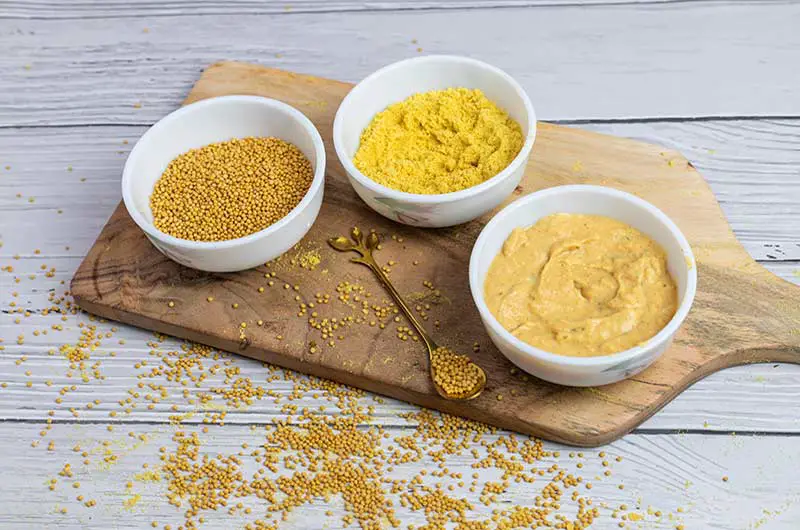Mustard – spicy, creamy sauce – forms a triad with ketchup and mayo, to make an ordinary burger taste wow.
Most of us have a half-used bottle of mustard lying around somewhere. For that day when you want to drizzle some on a hot dog or steak.
When you finally reach for it, something seems off. The liquid has separated leaving solids at the bottom.
While you play safe and make the most of your meal with other dressings and sauces, it sets you off on a journey of perplexing questions.
Is my mustard spoiled? If it does, how do I tell that mustard has gone bad? Could I have saved it by storing it in the refrigerator?
This guide is an attempt to clear all your doubts about storing mustard. An attempt to help you enjoy it down to the last bit in the jar.
The mustard we talk about in this article is the sauce or paste, and not its seed or powder form (which gets a special mention).
So,
Can mustard remain fresh without being refrigerated?
Yes, mustard does stay fresh without refrigeration. How long your mustard remains fresh will depend on whether your bottle is opened or unopened.
The nature of mustard is acidic and it is uncommon for a quality mustard sauce to spoil easily. But you need other conditions working in its favor.
If you want to make your mustard last longer, then consider storing it in the fridge. This can extend the shelf life by a good six months to a year.
The shelf life will vary from product to product as some mustard types contain other ingredients that could affect their freshness. The way you store it matters as do the temperatures in your kitchen.
Before we learn about these mustard types, let’s find out
Does mustard go bad?
Like all perishable food, your favorite mustard (a simple mix of mustard powder, salt, seasonings, and vinegar) will eventually go bad. But it tends to last anywhere from two months to three years when stored well.
Unopened mustard lasts well beyond its printed “best by date” which is usually six months.
Manufacturers’ discretion and sometimes customer feedback dictates this printed label date. This time limit happens to be a conservative estimate regarding the product quality.
In other words, the producers or company is vouching for its quality and not food safety.
In short, the shelf life of mustard, ingredient list, and storage method will determine whether your mustard will last without refrigeration.
Check Out How Long Can Yogurt Sit Out? [A Complete Guide with Q&A] to know whether other dressing ingredients can be kept out.

Different Types Of Mustard
Mustard is a condiment prepared from the white/yellow seeds of mustard plants. Yellow seeds tend to have a milder heat quotient and pungent taste compared to black and brown seeds.
Mustard’s popularity is largely on account of that subtle hint of heat and the lack of sugar and fat. Commercial mustard (not seed or powder) does have quite a bit of sodium added in, mostly for extra flavor and as a natural preservative.
While American mustard is similar to the English variety, other versions abound. Just take a good look at the grocery section next time, and you’ll know what I am saying.
A simple mustard sauce is often nothing more than a cold or cooked mix of mustard powder, vinegar, and salt. But there are other types of mustard available and the taste ranges from spicy to sweet. Various spices, herbs, aromatics, sweeteners, and seasoning mixes get added in and this affects the flavor profile of your favorite condiment.
Despite the numerous offerings, some are more popular than others.
American Mustard – This mild and creamy version was specifically developed in 1904 by George French for Americans. It is also called Ballpark Mustard.
English Mustard – This is a thicker and spicier version compared to the American version. The bright yellow color often comes from the addition of turmeric powder.
Deli Style Mustard – A hotter and coarser mustard sauce popular in many parts of the US. The sauce is usually made with brown mustard seeds and served in delis that often add horseradish for extra heat.
Chinese Mustard – Another sharp-tasting condiment and deceptively easy to make. Simply add water to dry brown mustard powder or cook it in sesame or peanut oil for a creamier texture.
Dijon Mustard – This sharp mustard comes from the Dijon region in France, but is now prepared in other places as well. The use of white wine with brown or black mustard seeds is its defining characteristic. This tends to be robust flavored that lasts longer due to its low acidity liquid. Dijon is often mixed into other sauces for that heat punch.
Honey Mustard – A sweeter version made with the infusion of honey and other ingredients. This 1:1 blend of mustard and honey is less acidic, but the honey works as a preservative. It can be combined with olive oil or vinegar for salad dressings.
Dry Mustard (Powder) – This is yellow (white), brown or black mustard seeds that have been dry roasted and ground into a fine powder. Some commercial brands add flour and turmeric to it.
Homemade Mustard – Ingredients vary from one kitchen to another. Some make a cold paste with nothing but water and salt. Others cook it into a creamy sauce in a bid to reduce its bitter taste. Apple cider vinegar or white vinegar is an important acid regulator and preservative used along with salt, flour, and spices.
How well do these mustards fare in the freshness game?
I‘ve created a chart showing their shelf life when stored in the pantry and in the fridge.
Mustard | Pantry | Refrigerator |
|---|---|---|
American | 1-2 years | 1 year |
British | 1-2 years | 1 year |
Dijon | 2-3 years | 1 year |
Honey | 2-3 years | 1-2 years |
Chinese | 1-2 years | 1 year |
Does Unopened Mustard Remain Fresh Without Refrigeration?
First thing first. All branded flavors typically have the same shelf life.
You don’t have to keep pre-packaged mustard in the fridge when it remains unopened. These will keep fresh in a cool and dry place like your pantry for one to two years.
Do you want to store it for longer? Then the refrigerator is the place to go.
Can You Keep Opened Mustard Fresh In The Pantry?
Yes, your half-finished commercial jar will stay fresh in the pantry for one or two months, before a bacterial attack. If you’re a mustard fan, preserve the sauce for one or two years in the chilled interiors of your refrigerator.
What about your homemade mustard sauce?
In the spirit of eating clean and healthy, you make your own sauces and condiments. You even add natural preservatives like salt, honey, and vinegar to it.
The next step would be to preserve it properly –
How To Store Homemade Mustard?
Homemade mustard containing vinegar or salt will stay fresh at room temperature for 1-2 days at the most. Pack it in a clean, airtight container to prevent moisture and other contaminants from getting in.
Beyond that, you’ll have to dispose of it or place it in the fridge. At 40°F, it will taste great for 7-10 days before losing flavor and going spoiled.
Do dry mustard and whole seeds need refrigeration?
Mustard powder lasts in the pantry cabinet (dry and dark) for 1-2 years. Seeds remain fresh outside the fridge for a short while before turning rancid (due to the oil content). You can extend their shelf life by storing them in the refrigerator for a few more months.
Here is a table you can bookmark to know how long your regular mustard remains fresh.
Mustard | Pantry | Refrigerator |
|---|---|---|
Unopened | 1-2 years | 1-2 years |
Opened | 1-2 months | 6-12 months |
Homemade | 1-3 days | 7-10 days |
Dry Powder | 1-2 years | Not Applicable |
Whole Seeds | 2-4 months | 3-6 months |
So, coming back to your original query. The squeeze bag of mustard is still lying around in the kitchen and you’re not sure it’s safe to consume.
Interested in knowing more about food shelf life tips? Find out: How Long Does Apple Cider Last Opened?.
How To Tell If Your Mustard Has Gone Bad?
Smell the mustard! If it stinks or gives off a sour smell, avoid using it. Your sauce is already spoiled or in the process of spoiling.
Squeeze out some mustard and check it for visible signs of “gone bad”.
Is there white or green mold on the mustard? Has the smooth texture changed into an unappetizing lump sitting at the bottom of the jar?
These are clear indications that your condiment has seen better days. Discard it without a second glance.
Another reliable way to check (but slightly risky) is the taste test.
Has the flavor changed? Is it unpalatable?
Mustard loses its flavors over time and can be foul-tasting when it’s contaminated by bacteria.
Dump it!
You should make it a point to check through pantry and refrigerator storage regularly and throw away anything well past the use-by-date.
This would be 1-2 years in the case of our humble but enjoyable mustard.
Final Thoughts
Mustard is a tasty companion to many foods from burgers and hot dogs to crackers and raw vegetables.
Unopened mustard sauce will last beyond its best-by-date for a good 1-2 years. This remains fresh in the pantry for six months to a year, whereas an opened bottle has a short pantry stay of 1-2 months.
The refrigerator extends the shelf life of your mustard by 1-3 years depending on whether the jar is sealed, opened, or past its use-by-date.
Homemade mustard barely lasts for a couple of days at room temperature before it needs refrigeration.
Unfamiliar texture, sour smell, and bad taste are a few signs your mustard is no longer fresh and that you need to buy a new jar.
Do you store your mustard in the pantry or the fridge? Let us know in the comments.
Frequently Asked Questions
Does packaging affect mustard’s freshness?
According to food experts, a glass jar of mustard will last for 2 years in a glass jar. Your plastic squeeze bottle will keep the mustard fresh for 18 months. Sadly, single-use packets last around 6 months.
How long does a mustard dish last?
While mustard is said to last as long, it will remain as good as the fastest-expiring ingredient in your dish or recipe. If your dish stays good for 3-4 days, then you’ll have to chuck it after that whether it contains mustard or not.

